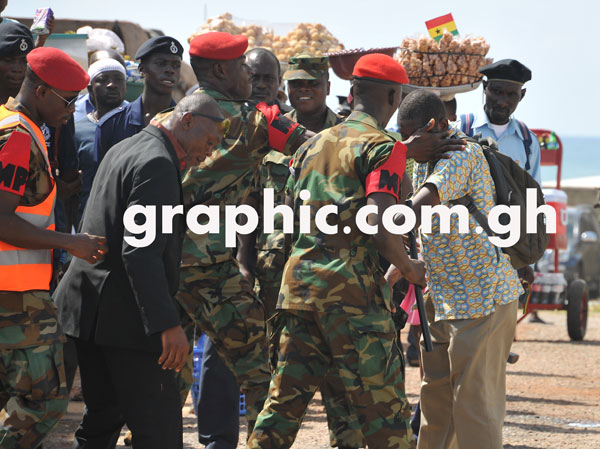Food for big mouth
 Mistakes are lessons of wisdom. The past cannot be changed. The future is yet in your power.
Mistakes are lessons of wisdom. The past cannot be changed. The future is yet in your power.
— Hugh White
Advertisement
The matter of the Ghanaian Times photographer who was assaulted by some military personnel during the independence anniversary, the one-sided report on investigations into the matter conducted by the Ghana Armed Forces, the subsequent fence-ending by the military and the desire of the Ghana Journalists Association to pursue the matter, could be likened to the Akan proverb of “sε obi ka sε, bεgye aduane hyε woano pipiripie mu a, na wonyawo, enso na wayawo”.
The argument is that when someone asks you to come and take food into your big mouth, it is not an insult, but it is an insult.
The issue is that being hungry has nothing to do with the size of your mouth.
However, in such situations we are able to identify those who cherish their dignity and those who have no reputation to protect and guard.
Thus where the hungry man is only interested in food, he will take the offer and lose his dignity just as Esau did to sell his birth right to Jacob. However, if the hungry man has a reputation to protect, the offer will be rejected flatly.
That is the lot of the Ghana Journalists Association in the face of the report of the Ghana Armed Forces exonerating the military from any culpability in the face of the needless assault on Vincent Dzatse, the Ghanaian Times photographer and victim of the military assault.
Against hard core evidence in the public domain, the military maintained that “the outcome of investigations, diligently and dispassionately conducted, suggests no wrongdoing on the part of the soldiers as they acted within the rules and guidelines governing the activities at the time of the anniversary parade”.
This reflects the report on the investigations except that the process was neither diligent nor dispassionate, since at no point was it mentioned that the victim was contacted.
How can a diligent and dispassionate report take into account testimonies of witnesses which exonerate the soldiers but discount statements pointing out that Mr Dzatse was slapped?
There is no mention of a report from Mr Dzatse before the committee, except a statement he gave to the police but which is being discounted.
At least, even if the Greater Accra Regional Police Public Relations Officer hinted that he did not see Mr Dzatse being assaulted, he testified that those around told him that the photographer was slapped.
If indeed, Mr Dzatse brought all the trouble upon his head and was the aggressor, since he is alleged to have impaired security arrangements, why is the military the one to take the first step of mending fences?
In the report at paragraph (9), it is stated emphatically that “it is clear that Mr Dzatse, who was supposed to be making the work of the military easier, valued the taking of pictures above the security of HE the President and therefore, did not find it necessary to co-operate with the Military Police.
By his action, Mr Dzatse had stepped beyond his professional bounds and needed to be brought in line which the Military Police did without any reservations”.
Thus, if indeed Mr Dzatse acted in bad taste and unprofessionally, why should the Military seek to mend fences rather than leave him to be disciplined, and more importantly, why did the Military not accept that he was slapped but with justification and within the law?
Even as the security of the President was important, Mr Dzatse was not at the Independence Square to stand and stare, but to get photographs of him to be published.
There can never be sustained peace without justice and the truth. Definitely Mr Dzatse was slapped as he seemed to have provoked and infuriated the soldiers as captured in the report.
There is thus no need to be euphemistic on stating that he was pushed and pulled.
Soldiers can at times shoot to kill when need be, so if Mr Dzatse was merely slapped for breach of security and imperiling and endangering the security of the President, there is no need for euphemisms.
Having worked for several years with the Director of the Ghana Armed Forces Public Relations Directorate, Col Mbawine Atintande (Mba) at Graphic before he joined the military, he might have undertaken the fence-mending initiative because of a conviction. But the exercise would have meaning only when the Military accept that Mr Dzatse was slapped, but with justification and then the exercise would be in order.
Until the Military accept responsibility and withdraw the one-sided report , it would amount to asking the GJA to take food into its big mouth. The GJA would thus have to either swallow its pride and play subserviency to the Military or call the bluff and reject the approach.
The GJA should not and must not sell the birthright of any member for a mess of potage.
Mr Dzatse is not the deviant the Military wants the public to see him.
Journalists should not be tamed or cowed into uneven friendship or reconciliation arrived at the expense of truth and justice, for as our elders say, if you do not talk about it, or if you keep quiet, you would not be treated with respect and decorum, “sε wo ankasa wo tiri ho a, yeyi wo ayi bone”. If our mouths are big, we will stay hungry for the sake of our dignity.
Article by Yaw Boadu-Ayeboafoh
Editor’s note:
The Military High Command rendered an unqualified apology to the victims at the meeting with the executive of the Ghana Journalist Association, a representative of the Private Newspaper Publishers Association of Ghana, Mr Dzatse, and Mr Botchway (a photographer of the Daily Graphic who was also a victim of the incident of March 6) and other senior journalists.




